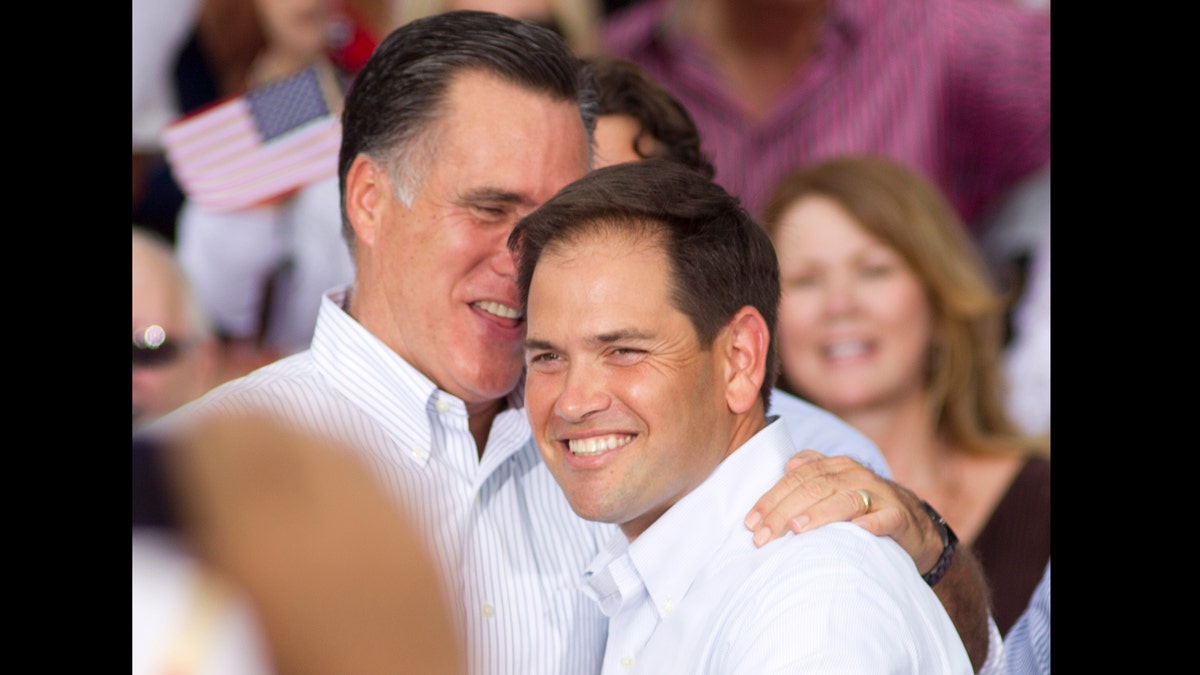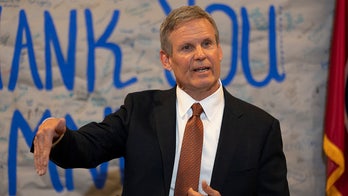
Mitt Romney, left, hugs U.S. Rep. Marco Rubio, (R-Fla.) after Rubio introduced him to the crowd during a campaign stop in Miami, Monday, Aug. 13, 2012. (AP Photo/J Pat Carter) (AP2012)
U.S. Sen. Marco Rubio, who was on the GOP short list for vice presidential contenders until nearly the very end, got something of a huge consolation prize – he will introduce Mitt Romney at the Republican National Convention in late August.
The role of introducing the expected Republican presidential nominee brings the potential to catapult Rubio – who already enjoys a high national profile – onto an even more prominent pedestal among the American public.
As the Republican National Convention announcement on Rubio noted, the prime-time nomination acceptance by Romney at the close of the convention, on Aug. 30, has the potential to draw tens of millions of viewers. Sen. John McCain’s speech in 2008, the GOP noted, brought in an audience of nearly 40 million.
Rubio, who turned 41 in May, will have the opportunity to show off his telegenic GQ looks, oratorical heft and all-around charm that have impressed those of all political stripes. On Tuesday, the GOP convention committee also announced that the convention’s keynote speaker would be New Jersey Gov. Chris Christie, who also had been rumored to have been a possible running mate, and whose in-your-face, unpredictable style runs in sharp contrast to Rubio’s more careful, measured approach.
The announcement of prime-time roles for both Rubio and Christie comes on the heels of the news on Saturday that U.S. Rep. Paul Ryan of Wisconsin – like Rubio, a Tea Party favorite – had been chosen to run with Romney.
Political observers had predicted some sort of starring role for Rubio at the convention if he got passed over as running mate. The convention, after all, is happening in his home state, he is a darling of conservatives, and one of the most valuable chips he could have brought to the table, it was thought by some, was a softening of the GOP image as indifferent or hostile to Latinos.
And indeed, the GOP’s announcement about Rubio on Tuesday included references to the junior senator’s Cuban roots.
"Marco Rubio symbolizes the greatness of the American dream,” said Republican National Convention Chief Executive Officer William Harris. “We are an extraordinary country because we have fought to preserve individual liberties that are the heartbeat of opportunity and achievement.”
“Senator Rubio has experienced this in his own life, which will help him bring tremendous focus to how Mitt Romney and Paul Ryan's agenda will lead the way to a better tomorrow.”
Rubio released a statement through the convention committee hinting at what his speech later this month will expand on – the notion that voters should choose Ryan and Romney because they’ll be the better choice for creating jobs.
"We are excited to nominate Mitt Romney and Paul Ryan and restore great leadership to our country,” Rubio said. “Future generations of Americans depend on the hard work we will do in the weeks and months ahead, and I know that together we will be successful in changing Washington and putting leaders in place who are committed to creating more jobs and opportunities for our people.”
For his part, Christie, 49, said it was an honor to be chosen to deliver the keynote speech -- the highest profile spot for someone not accepting the party's presidential or vice presidential nominations. The slot has launched many political figures, most notably Obama, who, as a little known junior senator from Illinois, became a household name after delivering the keynote speech at the Democratic national convention in 2004. Four years later, he won the White House.
“The challenges we face as a country are great and require the honesty and boldness of the Romney-Ryan team,” Christie said. “We have an opportunity in Tampa to make clear that if we tell each other the hard truths, tackle the big problems, and make bold choices, we will see America’s comeback.”
Several weeks ago, the Democratic national convention organizers announced that San Antonio Mayor Julian Castro would be their event's keynote speaker -- the first Latino picked for the role in the party's history. Republicans had a Hispanic keynote speaker in 1984 -- Katherine Ortega, who was U.S. Treasurer under the Reagan administration -- but none since then.
Many Republicans had wanted Christie to run for the GOP presidential nomination.
He insisted for months that he wouldn't run. But then came an intense weekend of reconsideration before he made a firm announcement at a news conference at the New Jersey Statehouse. His decision effectively made the campaign between Romney and the rotating cast of anti-Romneys who rose and fell as each primary came and went.
In leaving the 2012 melee, he said he wasn't seeking the job of vice president.
"I just don't think I have the personality to be asked," he said. "I'm not looking for that job."
Both Rubio and Christie -- seen as potential future presidential contenders -- have mixed histories with Latinos.
Christie angered many Latinos in his state when his administration called for budget cuts to programs that Latinos heavily rely on. He also was criticized for choosing a lieutenant governor, Kim Gaudagno, who as Monmouth County Sheriff signed on with Homeland Security to implement the controversial immigration enforcement program known as 287-g. That program called for, among other things, local police to be deputized as immigration agents.
At the same time, he sometimes has drawn the ire of proponents of strict immigration enforcement.
In a town meeting in Dover, home to a growing undocumented population, he said that being in the United States illegally was not a crime, but a civil violation – a comment that was assailed by some conservative groups.
And shortly after Arizona Gov. Jan Brewer signed SB 1070, the immigration law, Christie told reporters that he did not view the measure, which allows police to check immigration status, as something that would be right for other states.
For his part, Rubio himself has been controversial among Latinos.
One side says he is no true representative of Latinos because he opposes liberal immigration measures that the vast majority in the ethnic group support. The other side says Latinos are not a monolith, and that Rubio, and other minority candidates, should not be seen as traitors, or unrepresentative, when they hold conservative views.
“We think it’s childish to single out Marco Rubio [for his views] because he’s Latino,” said Bob Quasius, president of Café Con Leche Republicans, a group that says it favors moderate immigration policies, earlier this year in an interview. “Minority and women Republicans tend to be more harshly criticized.”
Florida-based critics of Rubio set up a website called “Wrong Way Rubio.” The site claims it is “dedicated to shining a spotlight on Sen. Rubio’s extremist positions.”
On issues watched by many Latino voters, Rubio has taken a hard line.
Rubio opposed Obama's Supreme Court nomination of Sonia Sotomayor, who is of Puerto Rican descent, and initially blocked the confirmation of Mari Carmen Aponte, who is also Puerto Rican, as ambassador to El Salvador.
He opposes immigration reform measures that would not first secure the border and more strictly enforce the laws already in place. He supports English as the country’s official language, and has praised Arizona’s controversial immigration enforcement law, parts of which were not upheld by the U.S. Supreme Court.
He has also, however, cautioned Republicans to watch their rhetoric on immigration – particularly their unsympathetic tone on what to do with the undocumented – and has urged them instead to shift their focus to legal immigration when discussing the issue.
He said he favored a restricted version of the DREAM Act that would grant a conditional type of legal status –but not open a path to citizenship- to the children of undocumented immigrants. He had said earlier this year that he was working on a draft of a more conservative version, but that seems to have fallen by the wayside.
Latino eligible voters number more than 20 million. They have proven they’re in no party’s pocket – they gave Barack Obama nearly 70 percent of their support in 2008, compared to about 30 percent for his GOP challenger, McCain. But about 44 percent voted for George W. Bush in 2004 when he ran against Al Gore.
Still, Democrats maintain a significant political advantage with Latinos, numbers that were only strengthened by the harsh rhetoric from Republican presidential candidates in this year's primary.
A Fox News Latino poll this year showed President Obama leading Romney among Latino likely voters by 70 percent to 14 percent. Other polls have showed Obama with a solid edge over Romney among Hispanic registered voters.
Political analysts say that in order to win the election, a presidential candidate needs to win at least 40 percent of the Hispanic vote.
This story contains material from The Associated Press.
Follow Elizabeth Llorente on Twitter: @Liz_Llorente
Elizabeth Llorente can be reached elizabeth.llorente@foxnewslatino.com
Follow us on twitter.com/foxnewslatino
Like us at facebook.com/foxnewslatino




